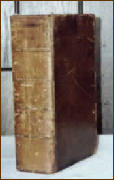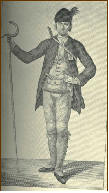JAMES BOSWELL—MAJOR PUBLICATIONS
James Boswell is best known for being the author of “The Life of Samuel Johnson, LL.D." which was published on May 16, 1791 in an edition of 1,750 copies. It is considered to be, by many critics, the greatest biography ever written in the English language. Lord Macauley, one of the detractors, said that “Boswell is the first of biographers” and that “if he had not been a great fool he would never had been a great writer”. His journals have established that he is also the greatest of all autobiographers.
 Life
of Johnson, 1833, Edited by John Wilson Croker
Life
of Johnson, 1833, Edited by John Wilson Croker
This book is the first example of a biography showing character, personality and physical flaws or as Boswell put it “not his panegyrick, which must be all praise, but his Life; which great and good as he was, must not be supposed to be entirely perfect.” It is written in a very clear, modern style with out too much eighteenth century idiom or Scottish expression. This may well be the primary reason for its continued success. It contains innumerable letters written to and by Johnson, as well as, anecdotes that have been proven to be unusually accurate, justifying Boswell’s comment that, “he has spared no pains to ascertain with a scrupulous authenticity” and “sometimes been obliged to run half over London, in order to fix a date correctly”.
An inveterate writer Boswell maintained a frank, candid daily journal of his activities, thoughts, emotions, lists of things to do, aspirations, people he saw and intended to see, amours, copies or originals of letters received and sent. Many of these items found their way into the Life of Johnson. His technique of using dramatic dialogue was very innovative for his time making his work superior to previous travel books or biographies. He provides a good deal of self-analysis and confession.
The first major book that he wrote, “An Account of
Corsica, The Journal of a Tour to that Island; and Memoirs of Pascal Paoli" published in 1768 brought him immediate recognition. During his Grand
Tour he visited Corsica, which was then in a struggle for independence from
Genoa and became a close life long friend of their leader, General Paoli. On
his return to England he did everything possible to encourage English
support, influence public sentiment, and provide armaments and funds to
assist the Corsicans. He became known as “Corsica Boswell” and at that time
had more fame than Johnson. He appeared at the Shakespeare Stratford Jubilee
of 1769, organized by his friend David Garrick, in Corsican dress (See The
Great Shakespeare Jubilee by Christian Deelman).
Paoli" published in 1768 brought him immediate recognition. During his Grand
Tour he visited Corsica, which was then in a struggle for independence from
Genoa and became a close life long friend of their leader, General Paoli. On
his return to England he did everything possible to encourage English
support, influence public sentiment, and provide armaments and funds to
assist the Corsicans. He became known as “Corsica Boswell” and at that time
had more fame than Johnson. He appeared at the Shakespeare Stratford Jubilee
of 1769, organized by his friend David Garrick, in Corsican dress (See The
Great Shakespeare Jubilee by Christian Deelman).
In criticizing the book Johnson wrote to him that, “Your History is like other histories, but your Journal is in a very high degree curious and delightful. There is between the History and the Journal the difference which there will always be found between notions borrowed from without and notions generated from within. Your History was copied from books; your Journal rose out of your own experience and observation. You express images which Corsica Boswell operated strongly upon yourself, and you have expressed them with great force upon your readers. I know not whether I could name any narrative by which curiosity is better excited or better gratified.”
 Hebrides, First
Edition, 1785 and Corsica, First Edition, 1768
Hebrides, First
Edition, 1785 and Corsica, First Edition, 1768
His Journal of a Tour to the Hebrides with Samuel Johnson, LL.D. was published in 1785. The basis for this book was the daily journal that he maintained all of his life. It deals with people, events, storms at sea, reactions of individuals to different events and is very personal. It has humor and excitement. Boswell, as usual, does not hesitate to make himself the butt of jokes or ridicule in attempting to bring forth Johnson’s opinions and insight or make his book more interesting. An example may be found in the memorable occasion when they were crossing from the Isle of Sky to the Isle of Col and caught in a storm. When Boswell asked if he could be of assistance (There was great danger of sinking) he was told to hold on to a heavy rope, which he later found out and reported was to keep him occupied and think that he was serving some constructive purpose. It was on Johnson’s arrival at Edinburgh and his invitation to stay at Boswell’s house in James’s court that Boswell’s wife Margaret insisted on giving up her bed chamber to Johnson so that he would be more comfortable. Although she was solicitous of Johnson’s welfare on this occasion, at one time in an apparent pique concerning his influence over Boswell, she remarked to her husband that “I have seen many a bear led by a man; but I have never before saw a man led by a bear”.
 Etching
by Thomas Rowlandson
Etching
by Thomas Rowlandson

James Boswell | Hester Lynch Piozzi | Samuel Johnson | Miscellany